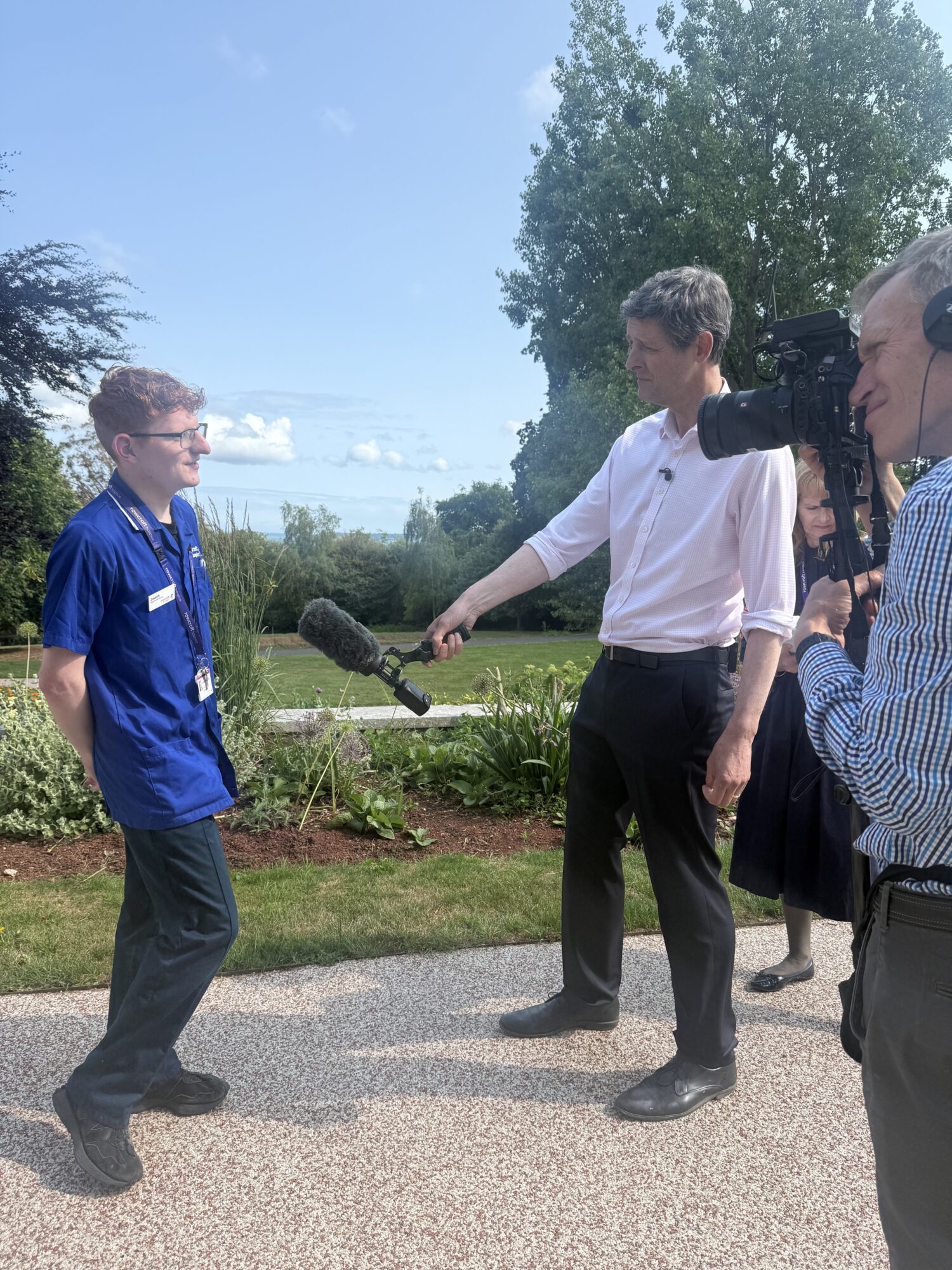Rowcroft at heart of national conversation
Rowcroft Hospice has been placed at the heart of a vital national conversation about death, dying, and the future of palliative care in the UK, following a recent visit from BBC News. As MPs continue to debate the details of the bill, the BBC selected Rowcroft to showcase the impact of hospice care as part of a high-profile news feature on the BBC’s national 6pm and 10pm news on Monday 16 June, as well as on its Radio 4 Today programme (at 2.42.37), and online on the BBC website.
BBC Health Editor Hugh Pym and his team spent two days at Rowcroft – on Wednesday 4 and Thursday 5 June – filming in the Inpatient Unit and in the community to shine a light on the difference that high quality hospice care can make.
Rowcroft flies flag for hospices across UK
“As the nation turns its attention to the Assisted Dying Bill, Rowcroft is proud to fly the flag for hospices across the UK,” said Mark Hawkins, CEO of Rowcroft Hospice. “We were honoured to show the realities of palliative and end-of-life care and highlight how this care transforms people’s final days with dignity, compassion and respect.”
The coverage comes ahead of a key Commons vote on the Terminally Ill Adults (End of Life) Bill that would allow terminally ill adults with six months or less to live the right to medically end their lives in England and Wales. The Commons vote is expected to take place on Friday 20 June and will determine whether the bill progresses to its next parliamentary stage.
Rowcroft takes a neutral stance on the issue of assisted dying
Rowcroft Hospice – like the wider hospice sector – does not take a position either for or against assisted dying, recognising the profound complexity and sensitivity of this issue, and respecting the wide range of views amongst its patients, families, staff, volunteers, trustees, and the wider community. The hospice states that this is a matter for society to decide through democratic processes in Parliament, and will continue to support all those in its care with compassion, dignity, and without judgment, whatever their views.
“We understand that people hold a range of deeply personal views on this issue,” said Mark. “Our role is not to campaign either for or against assisted dying. It’s to ensure that anyone facing the end of life receives the support they need. Whatever parliament decides, it’s vital that people are not forced to consider assisted dying due to a lack of adequate care provision.”
There is broad agreement – both in parliament and among the public – that hospices need stronger, more sustainable support, and that access to palliative and end-of-life care must be improved across the UK so that it’s equitable for all.
The urgent need for fairer funding of hospices
“Hospices are operating under intense financial pressure, and the current funding system is simply not sustainable,” added Mark. “We need a national commitment to fairer funding of palliative care across the country.”
Rowcroft supports more than 2,500 patients and their loved ones each year across South Devon, funded largely through local donations and charitable income. Like many hospices, it faces growing financial strain due to fragmented and inconsistent government funding, and an escalating demand for care.
“We’ve welcomed the government’s recent acknowledgment of the pressures facing hospices,” said Mark. “But real change means proper, long-term funding solutions. Hospices are an essential part of our healthcare system: they ease the pressure on the NHS, support families through the toughest times, and help people to live well until the end.”
Unanswered questions around the Assisted Dying Bill
The Assisted Dying Bill raises significant unanswered questions about the future role of hospices, should the law change.
“If assisted dying were to be legalised, hospices will need time, space and flexibility to determine their response,” said Mark. “A one-size-fits-all approach simply won’t work. Any implementation must allow hospices to act in accordance with their values, their staff and the needs of their local communities.
“We hope the BBC coverage will deepen the public’s understanding of hospice care. We’re incredibly proud of our teams who work with such compassion, skill and dedication. It was a genuine privilege to welcome the BBC and to help to shine a light on the vital role of hospices across the UK.”
Heartfelt gratitude to Jabez and his family
Rowcroft has extended its heartfelt thanks to the patients, families and colleagues who took part in the filming to help portray the reality of hospice care to a national audience. In particular, Rowcroft extends it deepest gratitude to patient Jabez Huw Petherick and his family for so bravely and generously sharing their story as part of the coverage – helping to highlight the compassion, dignity and support at the heart of Rowcroft’s care. Since the recording, Jabez has sadly passed away – he and his family had kindly granted the BBC permission to share his words after his death, to pay tribute to the staff at Rowcroft.
On BBC news:
- You can listen to the BBC Radio 4 feature on BBC Sounds from 02:42:37: https://www.bbc.co.uk/sounds/play/m002dmkf
- Read the news feature online here on the BBC website.

